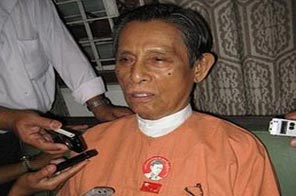Myanmar frees defiant Suu Kyi deputy from house arrest
YANGON: Myanmar's junta freed the deputy leader of Aung San Suu Kyi's opposition party from house arrest Saturday, prompting him to vow to resume his political activities ahead of elections later this year.
Tin Oo, 83, the vice chairman of the National League for Democracy, had been held without trial since 2003 when he and Suu Kyi were arrested after a pro-regime mob attacked their motorcade during a political tour.
His release on the day his current period of government-ordered detention expired came shortly before a UN rights envoy was due to visit Myanmar for talks focused on the polls promised by the ruling generals.
"The authorities informed me that they have withdrawn their restriction order," Tin Oo, appearing healthy despite his time in captivity and sporting traditional clothes, told reporters at his Yangon home after police officers visited him to tell him the news.
Tin Oo said he believed that Suu Kyi, who has been in detention for most of the last 20 years and had her house arrest extended in August after an incident in which a US man swam to her lakeside house, would be freed "soon."
"I believe Daw Aung San Suu Kyi will be released soon. We have had our history before -- after two or three months of my release, she used to be released," he said, referring to earlier periods of detention in the 1990s.
He said he planned to visit Yangon's famed Shwe Dagon pagoda on Sunday and would be at the NLD's offices Monday, while he also hoped to meet Suu Kyi at some point.
"They (the authorities) also told me not to take actions which can disturb the building of the state. But I will continue my duty as vice chairman of the party as I am their vice chairman," he said.
His release is the latest in a series of mixed signals to come from the ruling junta, which has appeared to respond to recent international moves to end its isolation, while at the same time continuing a crackdown on dissent.
The United Nations human rights envoy for Myanmar, Tomas Ojea Quintana, is due to start a five-day trip to Myanmar on Monday and expects to meet the foreign minister, but not reclusive junta leader Senior General Than Shwe.
Quintana has said he also wants to see Nobel Peace laureate Suu Kyi, 64.
In London, a British Foreign Office minister welcomed the news of Tin Oo's release and urged the junta to allow all political groups to take part in the planned elections.
"It is essential that the regime now grant Aung San Suu Kyi's request to meet with the leadership of the National League for Democracy (NLD) so they can function as a political party," said Foreign Office minister Ivan Lewis,
Lewis added, however, that "we cannot forget that there remain over 2,100 political prisoners in Burma," referring to Myanmar by its colonial-era name.
UN chief Ban Ki-moon also welcomed Tin Oo's release, saying he hoped the development "will contribute to the advancement of substantive dialogue between the NLD and the government of Myanmar."
Tin Oo was a former army general who was forced into retirement in the 1970s after falling foul of the country's former strongman General Ne Win.
He and Suu Kyi later helped lead the NLD to a landslide victory in Myanmar's last elections, in 1990, which the junta refused to recognise.
The pair were detained after a militia attacked her convoy near Depeyin in northern Myanmar in 2003, killing around 70 people. Tin Oo was transferred from prison to house arrest in Yangon in February 2004 under an anti-subversion law.
Tin Oo is likely to play a key role in deciding whether the NLD will take part in the elections, promised by the junta this year as part of a so-called roadmap to democracy.
No date has been set for the vote and critics say the plans are simply designed to entrench the generals' power.
Than Shwe said in a speech Friday that the elections would be free and fair and would be held "soon." Analysts predict they will take place in October or November.
Myanmar's 2008 constitution -- pushed through in a referendum days after a cyclone killed 138,000 people -- bans Suu Kyi from holding office, while reserving a quarter of the seats in parliament for the military.
But in recent months there have been signs of rapprochement between Suu Kyi and the junta, while US President Barack Obama's administration has promoted engagement with the regime because sanctions have failed to bear fruit.






